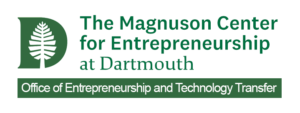Bone Health Start-Up Wins DEF Competition
Bone Health Technologies could improve the quality of life for elderly people around the world.

Elderly men and women around the world could have stronger bones — and therefore a higher quality of life — if the winner of the Dartmouth Entrepreneurs Forum Pitch Competition has its intended impact on the healthcare industry.
Bone Health Technologies, which won the $50,000 Jeff Crowe ’78 Grand Prize at the Finale of the DEF Pitch Competition, has developed OsteoBoost, a small, portable belt that produces vibrations that have been scientifically proven to improve bone density.
CEO Laura Yecies, D’85, explained the problem that Bone Health Technologies aims to solve: one in two women and one in four men will suffer a fracture related to low bone density. That costs the healthcare system up to $2 billion in direct health care costs alone, not to mention the massive cost of rehabilitation and nursing home care. But until now, there’s been no simple solution: bone density is built through high-impact exercise like running and jumping, which many elderly people are not able to do.
The premise for the OsteoBoost emerged from NASA-supported research that showed individuals could build bone health through vibration. The vibration study involved being strapped to a vibrating board — not very consumer friendly — but the founders of Bone Health Technologies saw the potential to deliver the benefit in a less disruptive way. Early data has shown that their product can improve bone density by 2.8%, which is comparable to medications.
“We can delay osteoporosis from late 60s to the 90s if they use the device for 10 years,” Yecies explained.
The device could be a welcome option for a generation of older people who don’t want bone loss to slow them down, and who are hesitant to go on medications.
“People don’t like the medication,” Yecies said. “They’ve seen it happen to their mothers and grandmothers, and they’re worried about this.”
At the finals event, six startups pitched their ideas along three tracks: healthcare, general business and social entrepreneurship. All of the teams had advanced from a competition of 36 semi-finalists last week. Two judges in each track chose a winner and a runner-up, and all six worked together to choose the recipient of the Grand Prize. In addition to the grand prize of $50,000, each first-place winner received $10,000 in funding, and the runners-up received $5,000 in funding. A people’s choice prize of $2,500 was also awarded.
Here are the other winners:
People’s Choice Award: Fabric Health
Fabric Health is a social entrepreneurship company that aims to help poor people access the healthcare system during one of their only blocks of down time: waiting at the laundromat. The company provides services that connect individuals with their insurance companies, encourages enrollment and delivers other light-touch services that have a big impact on health.
“We’re bringing care closer to where people live in their communities,” said co-founder and Tuck alum Courtney Bragg. “We’re a healthcare company, disguised as a laundromat.”
Fabric Health was also the runner-up in the social entrepreneurship category.
First place, social entrepreneurship: eTip.io
As we begin relying more heavily on digital financial transactions, fewer people have cash on hand to tip servers. Although restaurants have figured out a solution, other service industry workers, like valets or housekeepers, have seen a sharp decline in tips. That’s bad for everyone, says Shivan Goyal, D’18, co-founder of eTip.io: employees make less money, employers have higher turn over, and customers feel bad about not being able to tip.
eTip.io provides a solution, allowing users to scan a QR-code that lets them tip using ApplePay, Google Pay or a credit card, without downloading another app.
“We’re bringing financial wellness to the service industry,” said Goyal. Eventually, eTip.io would like to expand by providing a seamless platform for service-industry workers to save and invest their tips.
First place, general business: Waste*d
Waste*d aims to change the future of sanitation, by “harnessing the potential of what we leave behind.” The company, co-founded by alums Thor Retzlaff, Taylor Zehren and Brophy Tyree, has designed a sleek, clean and modern-looking portable toilet, but that’s just the start. In the long-term, their business model aims to monetize human waste by converting it into fertilizer.
The company has started a pilot program with the Rich Earth Institute in Brattleboro, Vermont, and will continue to try to disrupt the stagnant sanitation industry by providing an upscale and also eco-friendly sanitation service.
Runner up, general business: Hangen Innovations
Although the average American has become more familiar than ever with personal protective equipment during the pandemic, construction workers have known about PPE for a long time. As federal oversight and regulations increase, workers are expected to carry an array of personal safety items, from hard hats to ear plugs and safety glasses. The Hard Hat Caddy from Hangen Innovations aims to make that easier by providing a storage solution that can easily be moved from the truck to a belt to a worksite.
Alum Daniel Roper, CTO for Hangen Innovations, explained that the Hard Hat Caddy is only the first product. The company hopes to expand into other products targeted toward heavily-regulated industries.
Runner up, healthcare: Arctic AI
As the only surgeon and pathologist in his department at Dartmouth Hitchcock, Matt LeBoeuf understands the challenges in both roles. When a surgeon removes a tissue sample from a patient, a pathologist must quickly analyze the sample to determine whether there is cancer at the edges, which can indicate that more tissue must be removed. But the existing process is ineffective, which can increase patient morbidity.
That led LeBoeuf to develop Arctic AI, a technology that allows pathologists to analyze more of a tissue sample to increase accuracy. The platform also lets the pathologist and surgeon communicate about the result in real time, maximizing efficiency.
The quality of pitches and the wide array of endeavors presented at the finals show the impact that the Magnuson Center is having, said Director Jamie Coughlin.
“Our entrepreneurial community is growing and expanding,” he said.

